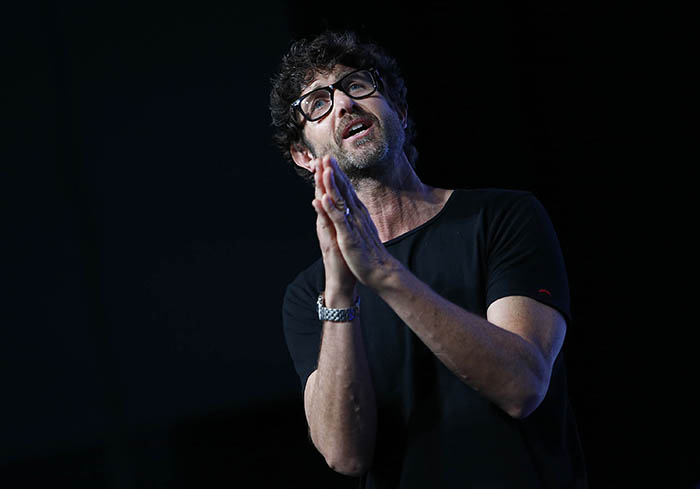
Story by Rick Vacek
Photos by Ralph Freso
GCU News Bureau
Jason Fritz’s Chapel talk Monday at Grand Canyon University can be summed up in six words:
We are all just like Mephibosheth.

Even though it is not nearly as well-known as David vs. Goliath, David’s kindness to Mephibosheth is “one of the all-time great stories of God’s grace,” Fritz told the GCU Arena audience. (Here's a slideshow.)
The Lead Pastor of Illuminate Community Church in Scottsdale defines grace as “showing kindness to someone who doesn’t deserve it, they couldn’t earn it and they could never repay it.”
Someone like Mephibosheth.
He received David’s grace simply because he was the last living relative of his grandfather Jonathan, who had asked David to never forget him or his family once David became king of Israel. The scene is set by 1 Samuel 20:13-14, in which Jonathan noted that his father, King Saul, considered David a rival after he put David in charge of his army:
But if my father intends to harm you, may the Lord deal with Jonathan, be it ever so severely, if I do not let you know and send you away in peace. May the Lord be with you as He has been with my father. But show me unfailing kindness like the Lord’s kindness as long as I live, so that I may not be killed.
Years later, David reflected on how he became king and realized that his friendship with Jonathan had played a special role. Saul and his three sons, including Jonathan, had been killed in a battle at Mount Gilboa, and the nurse who was caring for Mephibosheth fled with the young boy in fear that the new king, believing that the males in the new king’s family were a threat to his power, would kill them.

What happened next is explained in 2 Samuel 4:4:
Jonathan, son of Saul, had a son who was lame in both feet. He was 5 years old when the news about Saul and Jonathan came from Jezreel. His nurse picked him up and fled, but as she hurried to leave, he fell and became disabled. His name was Mephibosheth.
In those days, people believed that physical deformities were the result of offending God. No wonder Mephibosheth called himself a “dead dog.”
David didn’t care. He learned that Mephibosheth was still hiding in a miserable place called Lo-debar, which means “no pasture,” and asked that he be brought to the palace.
Fritz knocked on his lectern to imitate the knock on Mephibosheth’s door and talked of the fear he must have felt when he learned that it was the king’s men. Imagine his shock when he was told that would live with David and eat at his table.
It is the same scenario, Fritz said, as the time Jesus encountered the blind man. The disciples figured the man had done something to deserve his disability, but Jesus had other ideas:
“You know what Jesus says? He says, ‘Your theology’s messed up. God doesn’t work like that. God is a God of grace and mercy, and, you see, this guy was born blind through God’s sovereignty and also for God’s glory.’ And Jesus heals him, and God is given glory,” Fritz said.

At this point of the talk, Fritz put it all in perspective.
“Mephibosheth is you, and Mephibosheth is me,” Fritz said. “That’s really the point of the whole story – there’s this guy who was unworthy of kindness and yet he’s seated at the king’s table.”
One of the things Fritz likes best about the Gospel is that it helps us no matter what we think of ourselves:
“When you think that you’re too low, like you don’t deserve anything, the Gospel enters into your life and says, ‘No, no, no, just remember this: You’re very valuable because Jesus died for you.'
“And when you start thinking too highly of yourself, the Gospel enters your life and says what? Remember the cross, because you’re a sinner separated from God.”
He asked the audience to imagine what that dinner table was like, filled with brave warriors and David’s son, Absalom, and daughter, Tamar, and wise Solomon … and Mephibosheth. Again he rapped on the lectern, this time to imitate the sound of Mephibosheth’s crutches as he came to the table.
Fritz also drew a word picture of what it will be like when we draw our last breath on earth. Will we be invited to Jesus’ table? And if we are …

“You didn’t get there because there was anything good in you, that you deserved it. You couldn’t earn it,” Fritz said. “It was given to you as a result of what someone else did. Because of Jesus’ death on the cross, you’re at that table.”
He declared that you understand grace only if you are quick to show it to other people, and he closed with a challenge: He asked everyone to imagine someone in their life to whom they need to show grace. Could be someone in their family who will be next to them at Thanksgiving.
Then Fritz prayed to God:
“May we not only remember that we have been the recipient of Your grace. But, God, You call us to extend it to others, and in that way, we truly understand what has been extended to us.”
Contact Rick Vacek at (602) 639-8203 or [email protected].
****
To hear the music of the Worship team and Jason Fritz’s talk in its entirety, click here.
****
The Gathering speaker (7 p.m. Tuesday, Antelope Gymnasium): Jon Jennings, Pure Heart Church, Phoenix
Next Chapel (11 a.m. Monday): Thanksgiving Chapel (online only)
****
Related content:
GCU Today: Want Jesus' attention? Serve with mercy, grace
GCU Today: Mackey shows how to make God's '-ships' come in
GCU Today: Campus returns to full schedule of worship services
GCU Today: Jesus fishes for us, and it's not catch-and-release
GCU Today: Dyer urges students to hit 'go' on mission work
GCU Today: Musical Worship Chapel sparks a moving experience
GCU Today: Don't repeat Samson's mistakes -- watch your steps
GCU Today: What just happened? A mesmerizing Chapel talk
GCU Today: Hommel throws a curve in on-target Chapel pitch
GCU Today: Talley time at Chapel: Here's how to follow Jesus



































































